I'm new to tkinter, and what I'm trying to do is the following:
- Open a file dialog window to select a text file. (Done)
- Process the information of the file. (Done)
- Show in a tkinter window some of the information of the file. (Done)
- User selects some checkboxes from the previous tkinter window, the window then is closed, and the information from checkboxes is used later in the code. (Not working)
This is the code I have, probably not the best way to manage tkinter stuff.
# Import tkinter for file/directory dialogs.
from tkinter import *
# Definition of the structure of file's regions
# Just want to keep titles and subtitles in this part.
class SectionHeaders:
def __init__(self, title, subtitles = []):
self.title = title
self.subtitles = subtitles
class CheckboxesMap():
# fileSections is a list of SectionHeaders objects.
def __init__(self, parent=None, fileSections=[]):
# List of variables for each checkbox.
self.vars = []
# Helper variable
r = 0
for fileSection in fileSections:
# Variable and checkbox for the title.
var = IntVar()
chk = Checkbutton(parent, text=fileSection.title, variable=var)
chk.grid(row = r, column = 0, sticky = W)
self.vars.append(var)
r+=1
for subtitle in fileSection.subtitles:
var = IntVar()
chk = Checkbutton(parent, text=subtitle, variable=var)
chk.grid(row = r, column = 1, sticky = W)
self.vars.append(var)
r+=1
def get_states(self):
return map((lambda var: var.get()), self.vars)
# Function to run at the second tkinter window closing.
def closing_action(something, tkinstance=None):
if tkinstance != None:
tkinstance.destroy()
if isinstance(something, CheckboxesMap):
print(list(something.get_states()))
def main():
# Creating instance of Tk, initializing tcl/tk interpreter.
# We need to create this Tk instance and withdraw it in order to
# initialize the interpreter.
root = Tk()
# Avoiding to keep the Tk window open, withdraw hides it.
root.withdraw()
##### Some processing of the file content #####
## titles variable referenced below is a list
## of SectionHeaders objects.
## Added as part of EDIT 1.
titles = []
titles.append(SectionHeaders('Title 1', []))
titles.append(SectionHeaders('Title 2', ['Subtitle 2.1', 'Subtitle 2.2']))
titles.append(SectionHeaders('Title 3', ['Subtitle 3.1']))
# Creating a selection tool with the titles listed.
title_window = Tk()
tk_titles = CheckboxesMap(title_window, titles)
# The following three commands are needed so the window pops
# up on top on Windows...
title_window.iconify()
title_window.update()
title_window.deiconify()
title_window.protocol("WM_DELETE_WINDOW", closing_action(tk_titles, root))
title_window.mainloop()
# Obtaining variable states
print(list(tk_titles.get_states()))
Even with the selections as per the image, I'm getting the following in the console: [0, 0, 0, 0, 0, 0, 0]
Any ideas on how to keep these values even after the tkinter window is closed? What could be improved from what I have for tkinter stuff handling?
EDIT 1: Added titles list that can be used for the example. EDIT 2: Leaving minimal code example.
